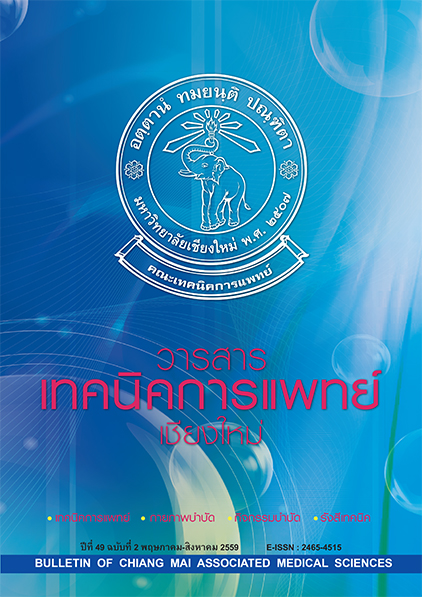Guidelines to develop medical laboratory, Ministry of Public Health, to the quality systems
Main Article Content
Abstract
Background: Medical laboratory services are key components of public health systems as they are essential for detection, treatment, and prevention of disease of public health services. Therefore, accurate and reliable medical laboratory should be available in every country. Accreditation of medical laboratory is one mean to promote quality laboratory services.
Objective: To present the status of accredited medical laboratory, to investigate factors influencing level of quality systems assessment and to build guidelines for developing medical laboratory, Ministry of Public Health to the quality systems.
Material and methods: Ninety subjects were recruited by multi-stage sampling. The questionnaire was developed and measurement of the influencing of factors, validity and reliability testing, was done. Data analysis was presented in term of mean, standard deviation, percentage and multiple regression analysis.
Results: The results showed that 52.2% out of 90 medical laboratories were accredited. Factors influenced (R2) level of quality systems assessment (p<0.05) were (1) policy and resource for medical laboratory quality management system (61.6%); the most important factor was lacking of essential equipment (beta = -0.585) followed by quality management system review (beta=0.497) and human resource (full time equivalent; FTE) (beta=0.454), respectively, (2) accommodation and environmental conditions (55.7%); the most important factor was the evaluation of medical laboratory safety checklist (beta= 0.625) followed by space allocated for the performance (beta=0.254), (3) essential equipment (45.5%); the most important factor was the quality and ready to use of essential equipment (beta=0.468) followed by calibration of equipment (beta=0.372), (4) medical laboratory quality development network (26.0%); the regional internal audit was important (beta=0.518), (5) medical laboratory unit in remote area (24.5%); the distance between medical laboratory unit and provincial public health office was important (beta=-0.503), (6) medical laboratory personnel (21.3%); the continuing education and professional development was important (beta=0.471), and (7) personnel attitudes toward medical laboratory quality system (15.0%) was important (beta=0.400)
Conclusion: According to guidelines for developing of the medical laboratory, Ministry of Public Health to quality systems, the study indicated 3 main challenges. They were 1) policy and resource for medical laboratory quality management system, 2) accommodation and environmental conditions, and 3) essential equipment, respectively. In addition, based on the findings, 4 recommendations were proposed including 1) medical laboratory quality development network, 2) medical laboratory unit in remote area, 3) medical laboratory personnel, and 4) personnel attitudes toward medical laboratory quality system, respectively.
Bull Chiang Mai Assoc Med Sci 2016; 49(2): 227-235. Doi: 10.14456/jams.2016.21
Article Details
Personal views expressed by the contributors in their articles are not necessarily those of the Journal of Associated Medical Sciences, Faculty of Associated Medical Sciences, Chiang Mai University.
References
2. The Medical Technology Council. Thailand Medical Technology Standard: 2012. Bangkok, Thailand; 2014 (in Thai)
3. Department of Medical Science. Ministry of Public Health Medical Laboratory Standard. Bangkok, Thailand; 2014 (in Thai)
4. Peter TF, Philip DR, Duncan HB, Aye-Aye K, Richard RF, Maurine MM. Impact of Laboratory Accreditation on Patient Care and the Health System. Am J Clin Pathol 2010; 134: 550-5.
5. Department of Medical Science [Internet]. Accredited Medical Laboratory [cited 2015 Mar 1]. Available from: http://webdb.dmsc.moph.go.th/ifc_qa/DBQA/ifc_qa/ userfiles/web_MOPH290957.pdf (in Thai)
6. Vanichbuncha k. Statistics for Research. 6th ed. Bangkok: Thammasarn; 2012 (in Thai)
7. Likert R. A Technique for the Measurement of Attitudes. Archives of Psychology 1932; 140: 1–55.
8. Rovinelli RJ and Hambleton RK. (1977). On the use of content specialists in the assessment of criterion-referenced test item validity. Dutch Journal of Educational Research 1977; 2: 49-60.
9. Cronbach LJ. Coefficient Alpha and the Internal Structure of Tests. Psychometrika 1951; 6:297-334.
10. Taveerat P. Research Methodology in behavioral science and social science. Bangkok: Srinakharinwirot University; 1995 (in Thai)
11. Srisa-ard B. Basic Research.7th ed. Bangkok: Suveeriyasarn; 2003 (in Thai)
12. Saiyen P. Keys of Success for Quality Development System in Phetchaburi Laboratory Network during 2009-2013. J Med Tech Assoc Thailand 2013; 41 (3): 4717-38. (in Thai)
13. Olmsted SS, Melinda M, Robin CM, Herbert CD, Jeffrey W, Preethi S et al. Strengthening Laboratory Systems in Resource-Limited Settings. Am J Clin Pathol 2010; 134: 374-80.
14. Opio A, Winnie W, Jackson A, Henry K, John NN. Country Leadership and Policy Are Critical Factors for Implementing Laboratory Accreditation in Developing Countries. Am J Clin Pathol 2010; 134: 381-7.
15. Wattanasri N, Manoroma W, Viriyayudhagorn S. Laboratory Accreditation in Thailand. Am J Clin Pathol 2010; 134: 534-40.
16. Alemnji GA, Zeh C, Yao K, Fonjungo PN. Strengthening national health laboratories in sub-Saharan Africa: a decade of remarkable progress. Trop Med Int Health 2014; 19(4): 450-8.
17. Ho B, Ho E. The most common nonconformities encountered during the assessments of medical laboratories in Hong Kong using ISO 15189 as accreditation criteria. Biochem Med 2012; 22(2): 247-57.
18. Shin BM, Chae SL, Min WK, Lee WG, Lim YA, Lee do H et al. The implementation and effects of a clinical laboratory accreditation program in Korea from 1999 to 2006. Korean J Lab Med 2009; 29(2): 163-70.
19. Kanitvittaya S, Suksai U, Suksripanich O, Pobkeeree V. Laboratory quality improvement in Thailand's northernmost provinces. Int J Health Care Qual Assur 2010; 23(1): 22-34.
20. Woodcock S, Glen F, Karen M, Barbara U, Patti RP. The Role of Standards and Training in Preparing for Accreditation. Am J Clin Pathol 2010; 134: 388-92.
21. Guindo MA, Shott JP, Saye R, Diakité ML, Sanogo S, Dembele MB, et al. Promoting good clinical laboratory practices and laboratory accreditation to support clinical trials in sub-Saharan Africa. Am J Trop Med Hyg 2012; 86(4): 573-9.
22. Mossalaeie MM. Laboratory quality regulations and accreditation standards in Iran. Clin Biochem 2009; 42(4-5): 316.
23. Kessler A. Laboratory quality regulations and accreditation standards in Germany. Clin Biochem 2009; 42(4-5): 315.


